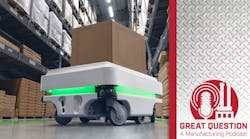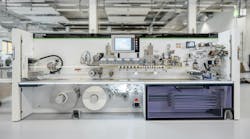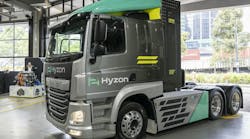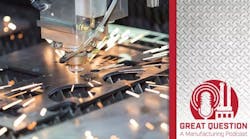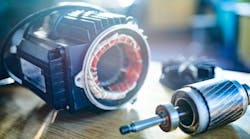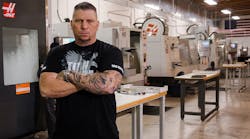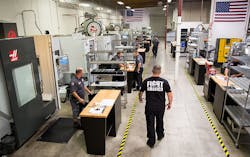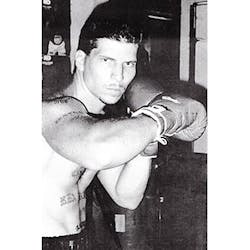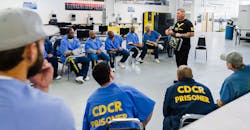"To be a machinist you're a certain type of person," explains Titan Gilroy, CEO of Titans of CNC. "You're a perfectionist."
The attention to detail he gives to the shop, from the yellow marking tape on the shop floor to the pristine condition of his Haas Automation mills and VMCs, is but a mere allusion to this declaration. Glimpsing the glimmering, smooth parts machined to the millimeter that were shaved and cut in the workspace truly exposes his obsessive pursuit of perfection.
These parts may end up on race cars or rockets, so every surface and angle must be engineered completely to spec, as an imperfection could throw off an engine's thermal dynamics or break at the worst of times. SpaceX and Elon Musk have sourced jobs to this shop for nearly a decade, most recently with the successful Falcon Heavy rocket launch. So Gilroy's self-identifying as a perfectionist shouldn’t be taken as arrogance, but a statement of fact and necessity of the job.
The unabashedly open machinist let the world behind the curtain with the MAVTV show TITAN American Built, which highlighted the machining process from design to delivery in a reality show format. Sure it's a bit scripted for TV production purposes, but the show, which ran for two years, perfectly encapsulated how in this trade, as in most professions, speed and creativity are the true tools to sharpen your competitive edge.
Now his following extends beyond casual cable viewers and to tens of thousands of real machinists and educators who use his free online training resources at academy.titansofcnc.com in their own personal journey toward professional improvement. To them, he is General MacArthur, Mr. Miyagi, and Professor X all wrapped up into one.
Click HERE to read about Titan Gilroy's efforts to revolutionize the machining industry.
You'd think a 48-year-old guy who runs a successful business, produced and starred in a TV show, and is currently lionized by his peers across the world always knew what he wanted to do. Maybe he was descended from a long line of blue-collar nobility and was preordained for greatness.
Well, if that's what you think, you’re half right. His mother's father was a foreman at Boeing, and during World War II painted nose art on the bombers, Gilroy shares. His grandfather on his father's side was a machinist for Chrysler. But the way his life started, it was anything but perfect—greatness only referred to the amount of pain and hardship he endured.
Gilroy, who was born in California, fled to Hawaii with his mom and sister before middle school to escape an abusive, alcoholic father. Soon after, the family they were staying with on the island of Maui got evicted and the family on the run had nowhere to go.
For a time he was homeless, hungry, and living in a tent on the beach with his mom. She cleaned homes and eventually made enough to get an apartment. Life got only incrementally better.
"We were in the worst neighborhood," recalls Gilroy, and he says being a small white kid made him a target. "I grew up getting beaten up by Tongans, Samoans, and Hawaiians."
If Gilroy has anything, it's the ability to get back up. An older neighbor saw what was going on and taught him how to box, giving him the skills to defend himself and earn respect.
"Eventually they all became my family," says Gilroy of his previous bullies.
Alone, he pieced together go-karts from scraps he found, and he drew, painted, and made his own surfboards. Socially, he scrapped to get by and earn friends. Now a lot tougher and fearless, with similarly minded friends, he was admittedly "on the wrong road."
He would often skip school to go surfing, failing every class except for math and art, which he aced.
"Ever since I was young I felt something amazing was going to happen in my life," he says. "Sitting in prison, I felt my entire life was over."
At 12, he was sent to a juvenile detention facility, and by 14, was back after he was caught with a friend who had stolen some guns and charged with 21 counts of armed robbery.
After being kicked out of the public school system, a Catholic school took him in. He worked to pay off the tuition, staying out of trouble until his senior year, when he was forced into an impromptu street fight with six guys.
Now 6'2 and 200 pounds, with years of boxing training, he "took care of business." That equated to serious injuries to his attackers, though a jury found him not guilty.
He estimated to have been in "hundreds of street fights."
The kid who loved art and building things now made a name for himself by breaking bones.
Rumors of an unbeatable streetfighter reigning down blows in the Rainbow State reached the mainland. Dick Saddler, who had trained both George Foreman and Muhammed Ali, agreed to take him on. The unproven heavyweight was given a plane ticket and a contract in 1988 after high school graduation. Gilroy racked up 35 wins in 38 amateur fights and moved to Las Vegas to train with Top Rank Boxing. He was on a path to stardom.
The fight that would change his life was back in Hawaii, though. While he was on vacation, his past got the best of him. Old friends, seedy nightclubs, too much alcohol. The results were inevitable. Trying to break up a fight erupted into breaking one guy's jaw and damaging another's brain, though the concrete floor did most of the hard work.
The court sentenced him to 16 years. To Gilroy, it was a life sentence:
"Ever since I was young I felt something amazing was going to happen in my life," he says. "Sitting in prison, I felt my entire life was over."
The downward spiral continued right into solitary confinement, where he spent six months. Then he got a roommate who would have ended his solitude, if not for slitting his own wrists while Gilroy slept. He called the following days "the worst time in my life."
After deciding to follow the rules and do his time, he focused on art and learning computers, making cards for other inmates to give to their families in return for food. Then an opportunity to work outside picking pineapples on the "pine line" arose.
He considers it the hardest job he's had, but it was in the sun and it knocked a year off his sentence. Then Top Rank Boxing intervened to get Gilroy paroled. This meant freedom and another chance to turn pro.
Back in Las Vegas, he simply couldn't avoid trouble. In this situation, Gilroy actively tried to avoid it. A drugged-up neighbor threatened his wife and attacked him. Same as before, one punch and one crash landing on the concrete. This time the police, who Gilroy had previously asked for help with the neighbor, did not press charges.
Gilroy was done with violence, packing up his family and moving to Sunnyvale, California. A newspaper's wanted section steered him into a nearby metal and tool shop, where he got himself a $9/hour job sawing metal.
He also discovered a new path.
He upgraded to a more advanced shop, Zinola Manufacturing. The novice started on a Proto TRAK manual mill retrofitted to act like a manual mill, and within weeks was learning how to program the CNC machines. He was a natural, becoming head programmer in six months.
"My math and arts kicked in," he says. His short-lived boxing career did teach him to always try to go harder and faster. He traded rearranging rib cages and noses for blocks of metal but was just as fast and aggressive as in the ring. The now twenty-something family man discovered the financial benefit of making more parts in less time.
An important note is that he never compromised quality, as customers, including Siemens and NASA, could very easily find a new shop if perfection was sacrificed. Since then, perfection is the one thing in Gilroy's life that remained constant. He has also lost a lot (his house, boat, and nearly his business during the 2009 recession) and found a purpose (faith in God and a drive to lift up American manufacturing).
Along with teaching his tricks to excel and speed up production and training time, Gilroy made it a mission to reform the prison system. The prison population has almost doubled since Gilroy served his time, and the national 5-year recidivism rate—or percent of released prisoners getting sent back—is more than 76%, according to the Bureau of Justice Statistics.
He filmed several episodes of his show, now called Titans of CNC, at San Quentin State Prison's machine shop. He helped bring in new machines and personally oversaw training to create employable 21st-century machinists, who like him, might just need a second chance.
"I take this as the biggest opportunity that has ever come into my life," Gilroy says.
As for storybook endings, that one is absolutely perfect.
